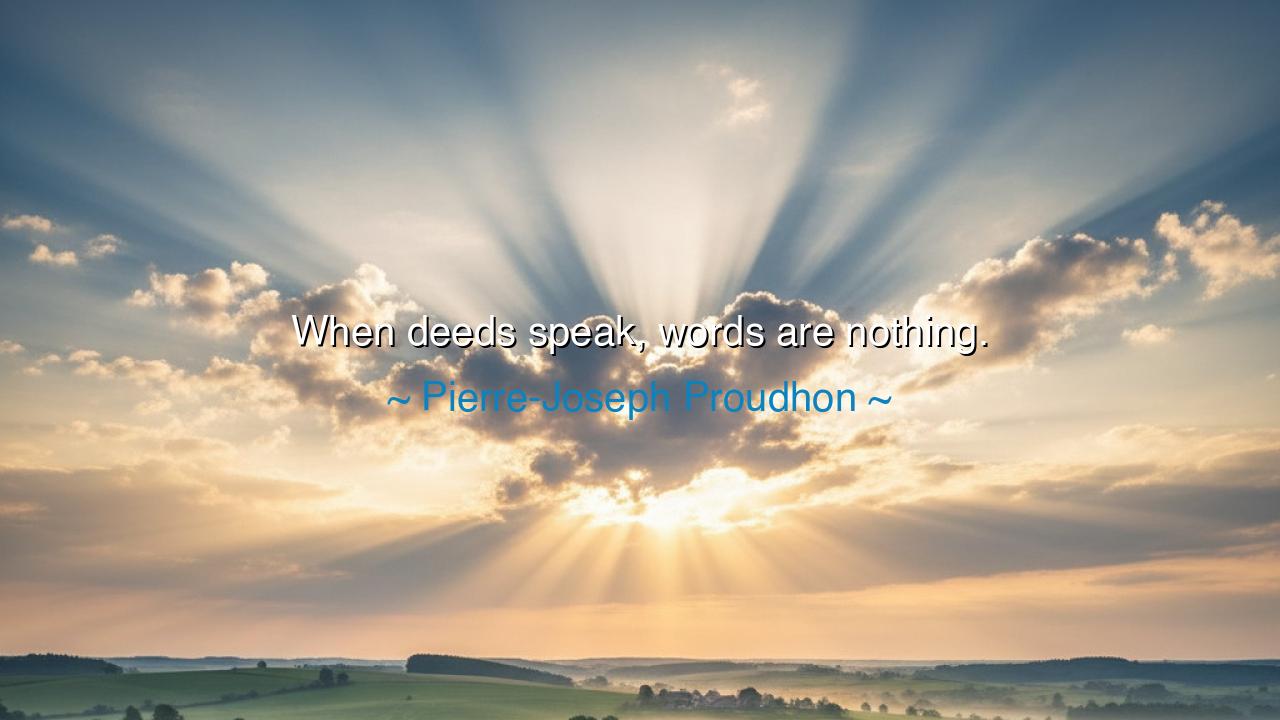
When deeds speak, words are nothing.






“When deeds speak, words are nothing.”
Thus declared Pierre-Joseph Proudhon, the French philosopher and social reformer, a man of conviction and action who sought justice not in speeches, but in the living movement of human will. In these few words, he expressed an eternal truth: that action is the truest measure of intent, and that words, no matter how eloquent, are hollow without the strength of deeds to sustain them. Proudhon lived in an age of revolutions, when fiery rhetoric filled the streets of France — yet he knew that true transformation is not carried on the breath of promises, but in the actions that follow them. For when deeds speak, they thunder; they silence all argument, all pretense, all empty persuasion.
Born in 1809, Proudhon rose from humble beginnings, working as a printer before becoming one of Europe’s most radical thinkers. He witnessed the power of words to stir crowds — the cries of revolution, the speeches of leaders — yet he also saw how quickly words could be betrayed. His philosophy of mutualism and social equity was not mere theory; it was a call to live one’s beliefs through daily labor and moral courage. Thus, when he said, “When deeds speak, words are nothing,” he was not condemning language itself, but warning that truth lives only in action. The deed is the soul of the word; without it, speech is a shell — impressive to the ear, but empty of life.
This truth runs through all history. The world has never been changed by talk alone, but by those whose actions embody their words. The prophets, the saints, the reformers — all were men and women who acted their truth. Mahatma Gandhi, for example, did not cry for justice from a podium; he became justice through his life. His words of peace were powerful, but it was his deeds — his fasts, his marches, his willingness to suffer for others — that moved the conscience of empires. When he walked barefoot to the sea to make salt, his silent act resounded louder than all the speeches of kings. It was as Proudhon said: when deeds speak, words are nothing — not because words are worthless, but because true words are fulfilled in action.
So too in the lives of ordinary men and women, the same law holds. The parent who sacrifices quietly for their child, the friend who remains loyal in hardship, the worker who toils honestly when none are watching — these are the true orators of virtue. Their actions speak with a purity no rhetoric can match. Deeds are the language of the heart, and all who live with integrity speak them fluently. Words may inspire for a moment, but actions inspire for generations. They leave footprints on the earth that time cannot erase.
Yet, there is danger in the age of speech — for our world is rich in words, but poor in follow-through. Promises are made, but seldom kept. People speak of love, yet withhold kindness; they praise truth, yet live by convenience. The wisdom of Proudhon burns against this hypocrisy like a flame: the only true speech is doing. The man who acts justly need not proclaim his virtue, for justice itself will testify. The woman who serves need not boast of compassion, for the world is already healed by her hand. The deeds of the righteous are their own witness, their own sermon, their own enduring song.
The lesson, therefore, is clear: let your life be your speech. Speak with actions, not only with lips. When you promise, fulfill; when you believe, act; when you love, serve. Let words be the seeds, but let deeds be the harvest. For only in the union of word and act does truth take root. Do not wait for applause, for the world hears action more deeply than it ever hears sound. As Proudhon taught, the power of deeds lies not in their grandeur, but in their authenticity — for even the smallest act done in sincerity can move mountains where grand speeches fail.
So, my child of will and wisdom, remember this: “When deeds speak, words are nothing.” Let your life itself be a declaration — of faith, of honor, of love. Say less, and do more. Let every promise be proven, every conviction be lived. For in the end, all words shall fade like echoes on the wind, but deeds — bright as flame, firm as stone — shall stand as the only true testimony of who we are.






AAdministratorAdministrator
Welcome, honored guests. Please leave a comment, we will respond soon